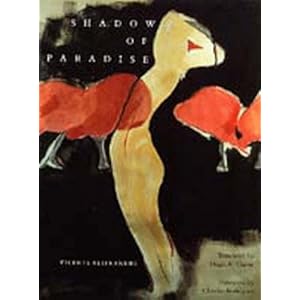Confundes ese mar silencioso que adoro
con la espuma instantanea del viento entre los arboles.
Pero el mar es distinto.
No es viento, no es su imagen.
No es el resplandor de un beso pasajero,
ni es siquiera el gemido de unas alas brillantes.
Aleixandre has been fortunate in his translators. Hugh A. Harter, who rendered Shadows of Paradise faithfully into sad cadences that unfold, poem by poem, to the lachrymose "Final Love," doesn't have to do much with Aleixandre's lovely lines:
Let the world spin on, and give me,
give me your love, and let me in futile
knowledge die, as kissing you we wheel
through space, and a star ascends.
Reading through this collection--and it's best to read Shadows as an unfolding lyric narrative rather than as individual poems thematically related--I thought of Antonio Machado's Fields of Castilla (1906-1917), also evocative of a lost age, also wistful and intimately connected both to Spain's history and its earth: "No todo/se lo ha tragado la tierra." But then again, most things are.

 http://www.amazon.com/Shadow-Paradise-Vicente-Aleixandre/dp/0520082575/ref=sr_1_1?s=books&ie=UTF8&qid=1356378151&sr=1-1&keywords=shadows+of+paradise
http://www.amazon.com/Shadow-Paradise-Vicente-Aleixandre/dp/0520082575/ref=sr_1_1?s=books&ie=UTF8&qid=1356378151&sr=1-1&keywords=shadows+of+paradise
No comments:
Post a Comment